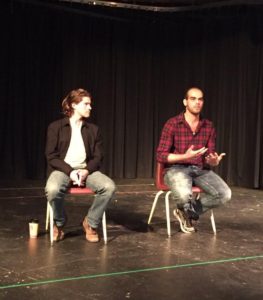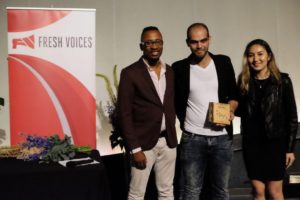This article, written by StFXAUT Communications Officer Philip Girvan, originally appeared in the Spring/Summer 2017 edition of The Beacon.

On April 27, 2017 a year ahead of schedule and less than a month after reaching an earlier milestone of $70,000, StFX for Syrian-Antigonish Families Embrace (SAFE) reached a fundraising goal of $100,000. These funds will allow SAFE to sponsor another family of Syrian refugees.
During the April 27 fundraising event, 21-year old Majd Al Zhouri, one the first Syrians to arrive in Antigonish, performed his one-person play To Eat An Almond. The acclaimed play debuted on March 24, 2017 during Theatre Antigonish’s annual one-act play festival.
Other recent stagings include a performance before 150 teachers at Dr. John H. Gillis Regional High School during an April 28, 2017 In-Service Day, and a May 11, 2017 fundraiser at Glasgow Square Theater in New Glasgow for Pictou County Safe Harbour Refugee Project. Majd also delivered a speech adapted from the play during the first national Interchange Conference held May 24-26, 2017 at StFX.
SAFE nominated Majd to the Vancouver Foundation’s National Fresh Voices Artivism Award. According to their website, the Fresh Voices Awards are a recognition of “the leadership of newcomer youth who, in British Columbia and across Canada, are working to advance social change based on themes and priorities such as immigration, education, and cross-cultural dialogue”. The Vancouver Foundation flew Majd and the two other finalists to Vancouver to attend the June 19, 2017 Fresh Voices Awards ceremony. SAFE funds made it possible for Majd’s sister Ranim to accompany her brother. Majd ended up winning.
The Beacon recently spoke to Al Zhouri, his co-writer, StFX alumnus Brendan Ahern, and collaborator Lionel Doucette about how the origins of the play, its therapeutic benefits, and its success.

Shortly after arriving in Antigonish, Al Zhouri enrolled in an English as an Additional Language (EAL) program offered free of charge, through the Antigonish County Adult Learning Association (ACALA). Al Zhouri was asked by his instructor, ACALA Executive Director Lise De Villiers, to write about something he couldn’t forget. This exercise resulted in a collection of writings, which Al Zhouri titled Blood Memories, that later became the foundation of To Eat An Almond.
Growing up in Syria, Al Zhouri spent little time writing and was never involved in the theater. Nonetheless, in the fall of 2016, he was cast as Prince Amir in Theater Antigonish’s production of The Ash Girl. Acting was suggested to him as a means of improving his English and his self-confidence by StFX English Professor Joseph Khoury. This experience allowed Al Zhouri to, as he puts it, “discover the beauty of the theater”. Al Zhouri described the theater as “a place to stay away from life’s difficulties. You go there and you turn things off and go to a different world. I liked that experience and I started thinking of using theater with my story”.
During the staging of the The Ash Girl that Al Zhouri became better acquainted with Lionel Doucette. Doucette had been teaching English to a group of Syrian men recently arrived to Antigonish including Al Zhouri’s father. Doucette, who has professional theatrical experience, was called in to assist Al Zhouri with his phrasing and later became involved with Al Zhouri and Ahern as they began transforming Blood Memories into a script. The three met shortly after Christmas 2016 to flesh out a play from Blood Memories. According to Ahern, they met “three times a week at the People’s Place for a month” but the writing stalled. Ahern describes the challenges:
“At the very beginning the three of us agreed that, as soon as it doesn’t feel right, as soon as it feels as though it’s slipping into a direction that we’re not comfortable with … we back off. It was hard. I was surprised in how open Majd was in talking in telling us these things. I thought it would be harder for him to talk; it ended up quite hard to listen to these stories.”
Early in 2017, Doucette was travelling and heard from Ahern and Al Zhouri that the play was shaping up. Earlier drafts which included sections on politics and history were set aside. Majd’s story became central. As he put it:
“Eventually we decided to do the story personal. I didn’t want to be talking about politics and all that stuff because it’s so complicated and the reason for this play was just me. I really wanted to tell the story and it’s the family story and my story and I really wanted to tell this story just to help myself deal with it. Help me move forward.”
The therapeutic aspect of the storytelling was significant. Al Zhouri had been struggling to communicate his pain. As he puts it, “I left Syria in 2013 to Lebanon and I lived there for three years. During those three years I didn’t talk about this and it’s all in me and it’s all traumatic in my head: sometimes nightmares, sometimes overthinking. So for three years I didn’t talk about it”.
Yet he needed to find a mechanism for releasing the pain that had accumulated over several years. Majd recalled attending therapy sessions accompanied by an interpreter and feeling frustrated that his impressions had to be filtered through an interpreter. In his words:
“Going to a doctor wasn’t working. My English wasn’t so good so I wasn’t able to explain to him all at pain. I didn’t want to tell my pain to a translator and then the doctor would be listening to the translator and not to me. I started looking for ways to tell my story and when I started writing, I felt different. My pain was on paper, but I felt more comfortable.”
Majd, who will begin studying engineering at StFX University in Fall 2017 noted the therapeutic benefits provided by writing and performing of “To Eat an Almond” and how the challenges of university are not as daunting as they may have been a year ago: “I’m not going to forget. I’m just making space and leaving room for everything that life will bring me cause right now I’m building my future. Next year I’m in university and, you … have to be, not empty from pain, but a little bit of space”.
“Blood Memories”, a collaboration between Madj and film director Peter Murphy, was screened at the Antigonish International Film Festival on Saturday, October 28.
To learn more about SAFE, including how to donate, visit their Facebook page.
